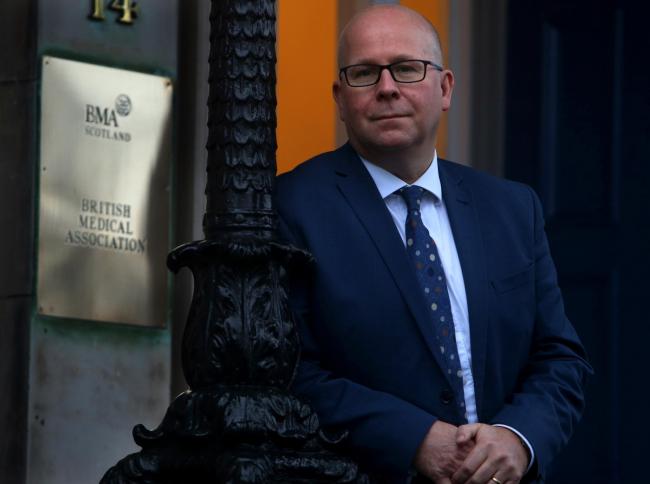This speech was delivered by Dr Andrew Buist at the 2020 SLMC conference on 4 December 2020.
***************************************************************************
Thank you Chair, Conference, 2020 has been a year like no other, and so I want to start with a thank you.
I want to thank every General practitioner in Scotland and every member of the general practice team from receptionists, cleaners and practice managers, to practice nurses, pharmacists and allied healthcare professionals. You have done a tremendous job in the face of this Covid pandemic – you have worked incredibly hard and adapted to keep general practice open for business. Overnight you transformed the service delivery model to reduce footfall and cross-infection, increasing access by remote methods while maintaining F2F consultations when appropriate and necessary. So yes we have remained open for business but not business as usual.
And I also want to thank the LMCs represented here today. You the representatives of the Local Medical Committees and your GP subs have shown tremendous local leadership throughout this adversity – working collaboratively with your HSCPs and Boards to manage the community response, supporting practices, helping establish and develop new services such as the CACs that have proved so important to help keep the rest of the NHS safe from Covid infection.
And we have had to put up with constantly changing challenges, from the PPE issues and infection control, to Shielding advice, the influenza vaccine, and now the Covid vaccine. Adjusting to changing availability of support services from secondary care, and the steady drift of workload into general practice
And if that was not enough, across the UK we’ve had misleading reports that general practice was really not that busy and that we were somehow trying to reduce access for patients. This irresponsible representation of the position simply does not reflect our reality. It threatens to turn the rainbows and public clapping into resentment that undermines trust and can lead to verbal abuse of GPs and our staff and even abusive graffiti on practice walls. This needs to stop. But it also underlines that we need better data on our patient contact activity in general practice to demonstrate just how much we do for the NHS. For example, the evidence we have seen for other parts of the UK is that patient contacts are up 20% on 2019 – and we have no reason to believe Scotland would be any different.
The public have been through a lot in 2020. At first they were afraid, fear then changed to other emotions; gratitude, anxiety, low mood, frustration and sometimes even anger. They want their NHS back, of course, we all want to get back to normality as soon as we safely can, but I don’t think we have done enough as a country to explain to the public what is happening in healthcare. That needs to come from the very top. It can’t just be left to clinicians on the front line to explain to every patient why their treatment will be delayed. We don’t know how long they will have to wait, we have no idea, because no one tells us.
I understand this type of public conversation causes concern amongst our political leaders, and that they fear that the opposition see such honesty as a weakness to be exploited. It is a sad reflection of our society. And so it is GPs and in many cases practice staff who are left to deal with the consequences – not the least of which are often very frustrated patients.
We simply must have clearer messaging from across the system to help the public understand what to expect of their NHS while we continue to deal with Covid, and to ensure patient expectations are realistic.
***************************************************************************
I wanted to pay tribute now to those members of the medical and other health and social care professions who have suffered through occupationally acquired Covid disease. It is a risk we all recognise exists in doing what we do for our patients. With sadness we mourn the passing of those who have died, and we recognise those who continue to suffer the longer-term effects of Covid disease.
I mentioned public anxiety, and the widely recognised rising tide of mental health problems. I had a wry smile the other week when I heard a psychiatry expert on the radio talking about the situation and what needs to be done, because the rise in MH problems almost entirely falls not on the specialist service but on general practice to deal with. The increase in anxiety and depression will not pass the ‘severe and enduring’ test our mental health services set, and we know all too well that such referrals will nearly always be rejected. So, general practice is left to deal with this largely alone. It underlines once again why we need a radical overhaul of mental health provision in this country. Services need to be much more readily accessible to patients, we need to invest in bringing services closer to the patient, along the lines of provision I recently saw at the Craigmillar Medical Centre in Edinburgh where the practice MDT has 3 MH workers, ready to see distressed patients promptly and without a fuss of paperwork with inclusion/exclusion criteria, but just because the GP has made an assessment and considers that input is necessary, thereby massively cutting referrals to CMHTs. This is where the new contract redesign of general practice needs to take us.
Now since Covid struck 9 months ago we have been working closely, sometimes daily or even twice daily with SG Primary care. And so I want to say ‘thank you’ for the collaborative work of the team led by Naureen Ahmed and Aidan Grisewood. It can’t be easy for them fronting up virtually as they do with SGPC on behalf of so many other Scottish government departments. But together we moved swiftly to agree many measures to support GPs and practices; this includes income protection, advanced funding to cover the extra costs of Covid, sickness cover from Day1, DiS cover, funding for PH opening, a GP locum contract, arrangements to support GP Wellbeing and more recently we’ve agreed pragmatic vaccine arrangements for influenza and Covid in GP practices and arrangements to support GPs with LongCovid.
***************************************************************************
National work on progressing the 2018 GP contract was paused in March due to the pandemic and was only restarted in August between the 1st and 2nd waves.
Regarding Phase 1, while there are many examples of excellent redesign of services in some areas, progress has been patchy and overall has not been good enough. The reasons for this are due to a combination of issues from insufficient workforce, to lack of premises, inadequate management support and perhaps funding. So, it seems we were already behind schedule pre-Covid, and it is now clear it will not be delivered in full by April 2021.
This is clearly disappointing. Before the 2018 contract, too many GPs were being asked to cope with workloads that were impossible to sustain and every day that we do not yet have full implementation is another day where more is being asked of General Practice than is reasonable. Covid has not made that any easier.
In January you provided practice data for the Income and expenses and workforce data collection, data that is so critical to modelling for phase 2 and yet it remains unanalysed, as the data analysts were redirected to working on data for the pandemic. The work on Phase 2 remains a priority to complete because without it we will not be able to deliver the investment and the additional 800 GPs promised by 2027, and without that we will not create the capacity required to generate sufficient EMG time that NHS Scotland needs to care for our aging population.
But while Covid has hindered progress towards delivery, it has also convinced many that the ambitious vision of the 2018 contract is the correct direction for G.P. in Scotland. We remain committed to delivery in full, and reflecting the reality of where we are, we have agreed new timescales with clearer endpoints starting with vaccinations in 2021 that will see regulatory and contract changes made to finally remove these services from the core contract and transfer responsibility to HSCPs. So, you can count the days to the end of responsibility for travel vaccinations. This will follow with regulatory change for CTAC and pharmacotherapy in April 2022. Where these services are still not provided by HSCP staff, transitional GP services will be necessary and will be accompanied by an appropriate level of recompense to drive system change.
I want to say some words about our Cabinet secretary, Jeane Freeman. This will be her last Scottish LMC conference before stepping down in May. I have found Jeane someone that you can do business with, she listens well, she is straight talking and while at times I have had to be her ‘critical friend’, overall, I consider she has done a good job for NHS Scotland in this most difficult of times.
Of course, with hindsight we would all do somethings differently, this is inevitable in such a complex situation as a pandemic, when tough decisions have to be made and the facts are not fully known. And yes scrutiny of the choices made is right and to be expected – but ultimately the responsibility to take those hard decisions lies with those in power and it is rather easier to criticise from the side lines. Going forward, I do hope that we can work together to ensure the right lessons from the pandemic are learned in a culture of co-operation and respect.
So, I take this opportunity to wish her well, but then of course there are still 5 or 6 exciting months to go before the May elections, and they say a week is a long time in politics.
Finally, conference, in conclusion I feel sure that you like me are looking forward to a return to normality in 2021. This week we welcome the start of the Covid vaccine delivery programme, where general practice will be playing its part. And we look forward to getting our GMS contract back on track with a renewed commitment to the MOU transformation of services. The agreed timescale for the transfer of service responsibility and a new focus on collaborative working, will create a more manageable workload, with more time for GPs to spend in their role as EMG, and in doing so address the GP workforce challenges by ensuring that general practice once again is an attractive career option.
***************************************************************************
Dr Andrew Buist, chair of SGPC
If you’re not a member of the BMA and feel inspired to join and make our collective voice stronger, please click here. If you’re already a member and want more information on how to make the most of your membership, please click here.
Photo credited to Gordon Terris/Herald and Times Group

